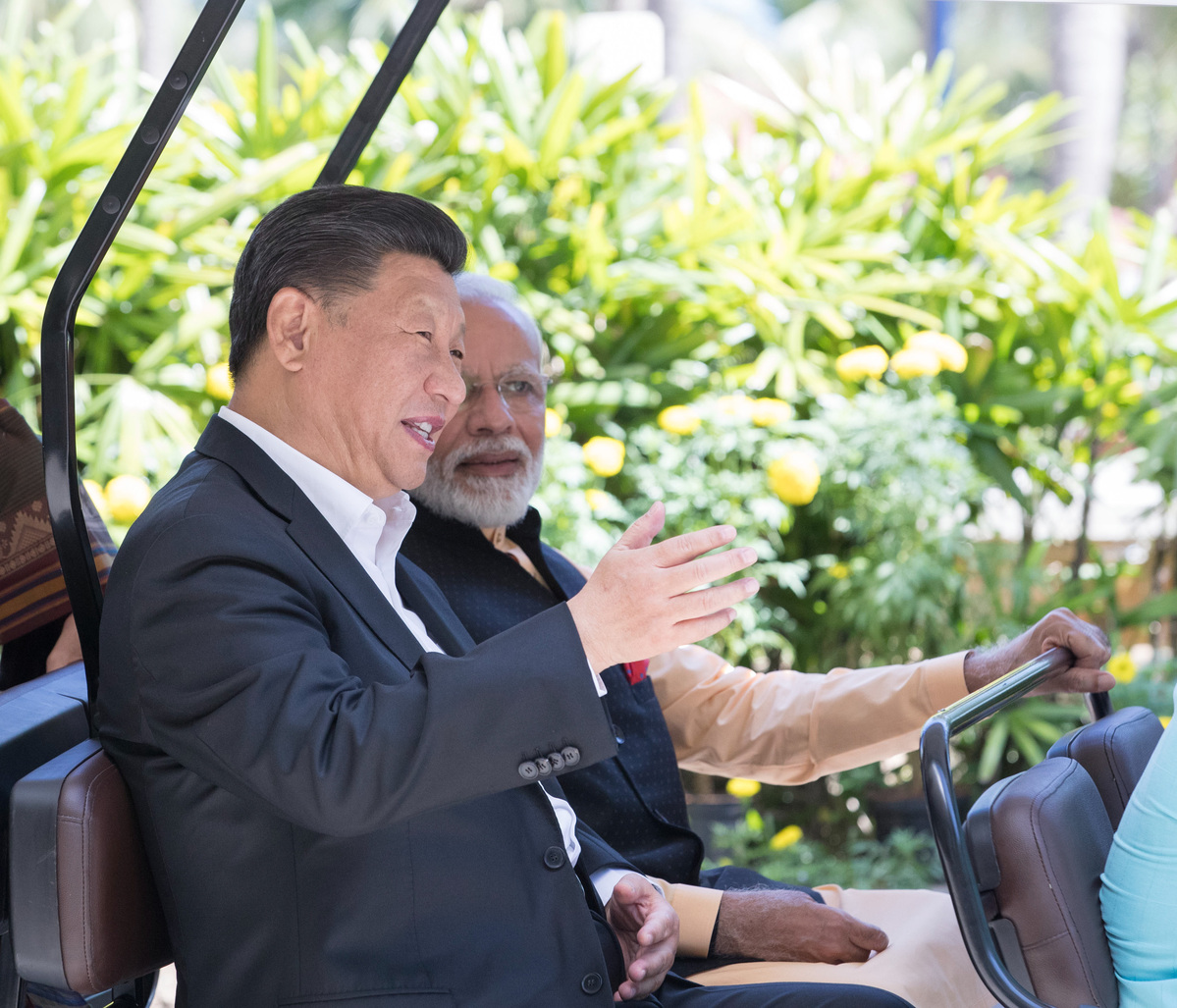



Chinese President Xi Jinping and Indian Prime Minister Narendra Modi meet at the 2nd India-China Informal Summit in Chennai, India, on Oct 12, 2019. [Photo/Xinhua]
Informal meeting in India designed to build mutual trust between neighbors
China and India can create an even closer partnership in the new era, as the countries' leaders have reset relations through an informal meeting over the weekend in the coastal city of Chennai in southern India, officials and experts said.
President Xi Jinping and Indian Prime Minister Narendra Modi had in-depth discussions on bilateral, regional and international issues of "overall, long-term and strategic" importance in their second informal meeting, Vice-Foreign Minister Luo Zhaohui told reporters after the meeting.
Xi called for building up strategic mutual trust between the two neighboring countries and defusing their differences through communication. He said the only correct choice is for the "Chinese dragon" and "Indian elephant" to dance together in ways that serve the interests of both countries.
Xi also called for earnest efforts to raise the level of military exchanges and security cooperation to enhance mutual trust between the two militaries and safeguard regional security and stability.
For his part, Modi said that in light of the uncertain international situation, maintaining stable India-China relations is positive and significant not only for the countries but for the world at large. He underlined the need to consider each other's major concerns and properly manage and control differences to prevent them from escalating into disputes.
The two leaders reaffirmed that both sides will remain committed to upholding peace and tranquility in the border areas, and will also jointly discuss and work out more trust-building measures, Luo said.
The second informal meeting came as some thorny issues have cropped up in bilateral ties, such as a boundary dispute and trade imbalance. It also took place at a time when the regional and international landscapes are undergoing complex changes.
Ruan Zongze, executive vice-president of the China Institute of International Studies, said understanding each other's strategic purposes and properly managing differences are crucially important in the relations of the two neighbors.
Strengthening strategic communication helps build up mutual understanding and trust, which in turn helps defuse their differences and ultimately stabilizes bilateral ties, Ruan said.
The two leaders agreed to set up a new high-level mechanism for dialogues on trade and economic issues to further promote balance in cooperation.
China is keen to make investments in India, while India wants greater market access in China, as well as action by Beijing to address the trade imbalance. It has agreed to expand imports of rice and sugar from India.
Xi told Modi during their meeting that Beijing welcomes investment in China by Indian pharmaceutical and information technology companies.
Stanly Johny, an international affairs editor of The Hindu newspaper, wrote in an article that the avenues of economic cooperation between the two countries remain wide open. "They could come up with a plan to take economic ties to the next level, addressing mutual concerns," Johny wrote.
Both Xi and Modi emphasized the importance of having a rules-based global trading system, as well as cooperation between China and India on important regional and global issues — both being the pillars of emerging markets and champions of multilateralism.
Sujan R. Chinoy, a China expert and director general of the New Delhi-based Institute for Defence Studies and Analyses, said there is no denying the fact that India and China must work together to forge stable relations in which competition does not lead to conflict nor differences to disputes.
Noting the maturity of Sino-Indian ties, Chinoy said both countries are keen to deepen engagement and bring stability and predictability to their relations, and it's in the interests of the two peoples that there is greater trust and cooperation and deeper friendship at all levels.
The first informal summit between Xi and Modi took place in Wuhan, Hubei province, in April last year. That meeting helped ease tensions arising from the standoff between the two militaries in Doklam, in the border area, and rebooted bilateral ties. This time, they agreed to hold the next informal meeting in China.
Experts said the informal nature of the leaders' meeting will continue and deepen contacts at the highest level and guide the future trajectory of China-India relations.

 Award-winning photos show poverty reduction achievements in NE China's Jilin province
Award-winning photos show poverty reduction achievements in NE China's Jilin province People dance to greet advent of New Year in Ameiqituo Town, Guizhou
People dance to greet advent of New Year in Ameiqituo Town, Guizhou Fire brigade in Shanghai holds group wedding
Fire brigade in Shanghai holds group wedding Tourists enjoy ice sculptures in Datan Town, north China
Tourists enjoy ice sculptures in Datan Town, north China Sunset scenery of Dayan Pagoda in Xi'an
Sunset scenery of Dayan Pagoda in Xi'an Tourists have fun at scenic spot in Nanlong Town, NW China
Tourists have fun at scenic spot in Nanlong Town, NW China Harbin attracts tourists by making best use of ice in winter
Harbin attracts tourists by making best use of ice in winter In pics: FIS Alpine Ski Women's World Cup Slalom
In pics: FIS Alpine Ski Women's World Cup Slalom Black-necked cranes rest at reservoir in Lhunzhub County, Lhasa
Black-necked cranes rest at reservoir in Lhunzhub County, Lhasa China's FAST telescope will be available to foreign scientists in April
China's FAST telescope will be available to foreign scientists in April
| 什么人不怕冷 | 伞裙搭配什么上衣 | 回头是什么意思 | 女性潮热是什么症状 | 吃什么能去湿气最好 |
| 天蝎座和什么座最配 | 麒麟到了北极会变成什么 | 37属什么 | 宝宝咳嗽吃什么药 | 什么属相不能挂山水画 |
| 解酒喝什么好 | apf值是什么意思 | dmdm乙内酰脲是什么 | 眼睛流泪用什么药 | 梦见自己爬山是什么意思 |
| 导管是什么 | 食指中指交叉什么意思 | 菊花有什么作用 | 针眼长什么样子图片 | 一什么永什么成语 |
| 世界上最多笔画的字是什么字hcv7jop6ns8r.cn | 气球是什么生肖hcv9jop5ns7r.cn | 氨咖黄敏胶囊是治什么的hcv8jop5ns1r.cn | 人大是干什么的hcv9jop2ns7r.cn | 心肌酶高是什么原因hcv9jop3ns9r.cn |
| 去韩国需要办理什么手续hlguo.com | 做爱为什么那么舒服hcv8jop0ns4r.cn | dj管是什么hcv7jop6ns3r.cn | 家里为什么有跳蚤hcv7jop7ns1r.cn | 消化不良的症状吃什么药hcv8jop3ns9r.cn |
| 清明节是什么时候hcv8jop5ns8r.cn | 簸箕是什么意思wuhaiwuya.com | 春晓的晓是什么意思1949doufunao.com | 胎儿打嗝是什么原因hkuteam.com | 阴虚火旺什么意思bjcbxg.com |
| 辞海是什么书hcv9jop4ns0r.cn | 胎儿胆囊偏大有什么影响hcv9jop3ns8r.cn | 马非读什么hcv9jop1ns3r.cn | 升白针叫什么名字hcv8jop3ns7r.cn | 乔字五行属什么hcv9jop2ns9r.cn |